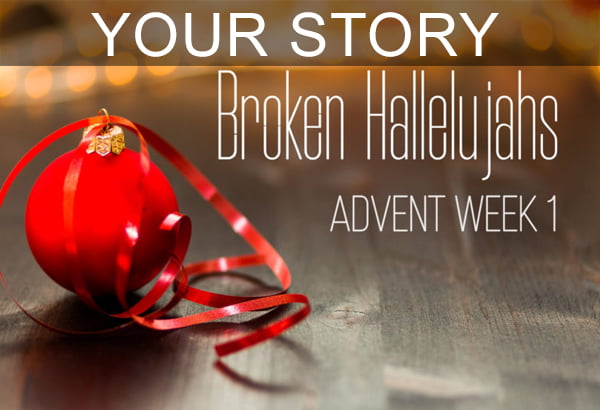Holy or Broken, There is Still Hallelujah

Perhaps the two greatest American songwriters of all time are Bob Dylan and Leonard Cohen. And what’s kinda crazy is that they lived at the same time, were contemporaries, and friends. And they frequently worked together, visited with each other, and hung out.
In the mid-1980s they were both on an international tour and they met up at a Paris café for coffee. Because those are the sorts of things you do when you’re a music star. You meet another music star in Paris for coffee. Bob Dylan complimented Leonard Cohen on one of his recently released songs called “Hallelujah” and asked Cohen how long it took him to write it. Cohen answered a couple years. Then Cohen asked Dylan how long it took him to write “I and I,” a song Cohen admitted he admired. Dylan said “about 15 minutes.”
The dichotomy is even more pronounced when you realize Cohen was lying. It took him a great deal longer than two years to write “Hallelujah.” It took him half a decade. He filled two notebooks with verses to this song. The song haunted him. He could never get it truly right. One time he ended up on the floor of a New York hotel in his underwear pounding his head against the floor screaming “I can’t finish this song!”
Who has pounded their fists at God wanting the whatever of your life to be over? Wanting to have your loved one back and life “normal” again? Who has been so angry at the painful life changes you are in? Who hates the waiting even though you know something is going to get better?
(Pounding your fists at God is a form of prayer, by the way.)
Advent is the four Sundays leading up to Christmas where we wake up every morning and get a piece of chocolate out of a calendar. No. Wait. Advent is the four Sundays before Christmas where we prepare our hearts to welcome the Christ child at Christmas. But Christians prepare for Jesus differently than the rest of the culture prepares for Christmas. The Church says Advent is about preparing for Christmas but by that we don’t mean getting the tree ready, getting your presents bought and wrapped, sending the Christmas card, etc.
The church talks about Advent as getting ready to wait.
Advent is a time where we talk about waiting for Jesus. Advent is about recognizing that we live in a world that needs saving, a world that needs redemption, a world that needs God to move and work and act. We await the fullness of God’s salvation in our lives, in our communities, and in our world.
Then Christmas does come. The waiting ends. Yet we wake up on December 26th pretty much the same people we were on December 25th. Just some of us with a couple cool new gadgets.
We still live in that broken hallelujah. Hence this song becoming our case study to learn about this waiting.
“Hallelujah” is one of the most viewed and certainly the most covered songs in music history. It’s been featured in basically every popular TV show there is: Grey’s Anatomy, The West Wing, Gossip Girl, One Tree Hill, The OC, Scrubs, General Hospital, etc. Pretty much every season of The Voice and American Idol and whatever show Fox is doing now that is basically American Idol but they don’t call it American Idol has someone sing “Hallelujah.” And really it owes some of its popularity to Shrek. It’s a thing.
The path it took to becoming a thing is a fascinating story. A story that I think can be illuminating as we look at the story of God’s coming into the world.
“Hallelujah” is a song of lived experience. It’s a song that feels grounded and feels real.
It’s a song that doesn’t deny the brokeness or despair that we feel.
It’s a song that doesn’t shy away from feelings of hurt or pain.
It’s a song for people who have lived and who still have the courage to hope.
The crazy thing about “Hallelujah” is that if you’ve heard the song you probably haven’t heard the original Leonard Cohen version. (Teaser.) That version is quite different from the ones that get played and covered all of the time.
In the original there is this middle verse that gets dropped in the subsequent popular versions, yet I think serves as the song’s core. Cohen writes and sings,
“You say I took the name in vain,
I don’t even know the name.
But if I did, well, really, what’s it to you?
There’s a blaze of light in every word;
it doesn’t matter which you heard, the holy,
or the broken Hallelujah!”
Alan Light, former editor of music magazines Vibe and Spin, wrote a long book on the history, composition, redefinition, and ascent of the song “Hallelujah.” And about that middle verse he writes:
“[Cohen] then builds to the song’s central premise—the value, even the necessity of the song of praise in the face of confusion, doubt, or dread. ‘There’s a blaze of light in every word; it doesn’t matter which you heard, the holy, or the broken Hallelujah!
“A blaze of light in every word. That’s an amazing line. Every word, holy or broken—this is the fulcrum of the song as Cohen first wrote it. Like our forefathers, and the Bible heroes who formed the foundation of Western ethics and principles, we will be hurt, tested, and challenged.
“Love will break our hearts. Music will offer solace that we may or may not hear. We will be faced with joy and with pain. But Cohen is telling us, without resorting to sentimentality, not to surrender to despair or nihilism. Critics may have fixated on the gloom and doom of his lyrics, but this is his offering of hope and perseverance in the face of a cruel world. Holy or broken, there is still hallelujah.”
Holy or broken, there is still hallelujah.
This Advent let’s start by being honest and saying our December 26th is going to look a lot like our December 21st. There’s no magic fix coming our way. But the call of Advent and the hope of Christmas is that the days are surely coming. There is a light. There is hope. God will not forget His promises. And God will see to it that one day His promises are fulfilled.
And now for us–in the waiting–there is still hallelujah. Whether holy in days that we feel we are living in God’s holy presence. Or broken on days when we feel we are living abandoned.
Holy or broken, there is still hallelujah.
_______________________________________________________
Suggested Bible reading: Jeremiah 33:14-16
Note: The general themes of Jeremiah involve Jeremiah announcing God’s judgment upon Israel and foretelling the defeat of Jerusalem at the hands of the Babylonians and their impending exile. A good bit of the book is God’s messages to the Israelites living in exile. There’s a famous verse from Jeremiah that folks will have in artwork on their walls or pillows or what not that is God saying I know the plans I have for you, plans to prosper you and not to harm you, plans to give you hope and a future. That verse was written to people who had witnessed the destruction of their home and are now living as captives in a foreign capital.
The underlying note of Jeremiah is despair. Israel was unfaithful which led to their downfall. During Jeremiah’s ministry, Israel experienced incredible suffering and loss. The setting of Jeremiah is suffering. And yet into this despair, into this loss, into this suffering we hear a small voice of hope.
Rev. Matt Benton is a husband, father, and pastor.
This is part 1 of a 4-part series that will be available every Sunday of Advent.
Comments
Trackbacks & Pingbacks
-
[…] for Bob Dylan. (Remember Advent Week 1 […]
-
[…] is part 4 of a 4-part series that will be available every Sunday of Advent. Part 1 is here. Part 2 is here. Part 3 is […]
-
[…] is part 3 of a 4-part series that will be available every Sunday of Advent. Part 1 is here. Part 2 is […]
-
[…] for Bob Dylan. (Remember Advent Week 1 […]






Dawn Vahl
Cant wait to start the study
Brenda!
Thank you! I think it is a rare gift. Happy Advent to you.